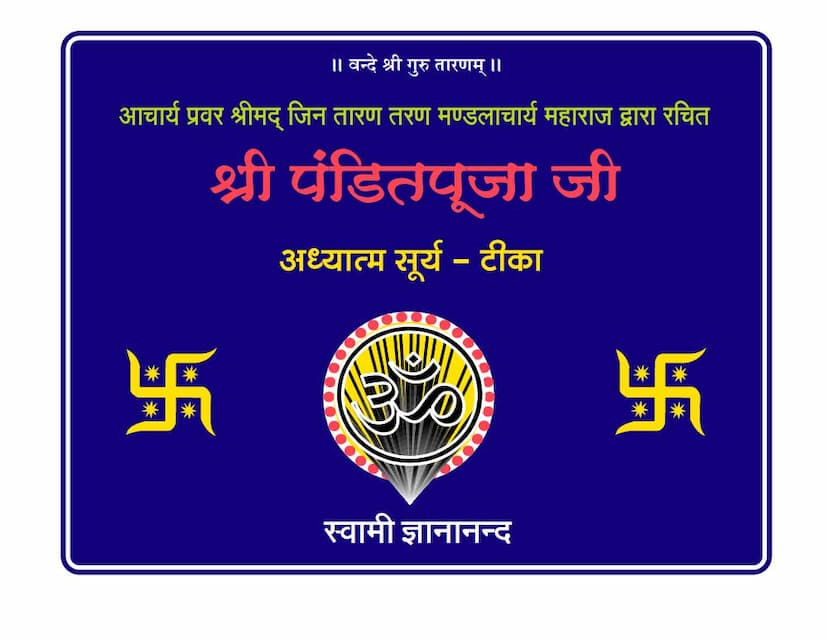Pundit Puja
Added to library: September 2, 2025

Summary
This is a comprehensive summary of the Jain text "Pundit Puja" by Gyanand Swami, based on the provided catalog link and the text itself.
Book Title: Pundit Puja Author: Gyanand Swami (as commentator/author of the commentary) Original Author: Acharya Shrimad Jintaran Taran Mandalacharya Maharaj (author of the original "Pundit Puja" text) Publisher: Bramhanand Ashram Commentary Title: Adhyatma Surya - Teeka (Solar commentary of spirituality)
Overall Theme:
"Pundit Puja" is a significant Jain text that elaborates on the path of spiritual realization and worship, particularly within the Taranpanth tradition, emphasizing the "Jnana Marg" (Path of Knowledge). It explains that true worship (puja) is not merely external ritual but an internal transformation, focusing on the realization and experience of the pure, soul-essence within. The commentary by Gyanand Swami aims to illuminate the profound spiritual principles expounded by Acharya Jintaran Taran.
Key Concepts and Structure:
The text is structured as a dialogue, presented through verses (Gathas) and detailed explanations (Vishesharth). The core of the "Pundit Puja" lies in defining what constitutes true worship, the nature of the ultimate goal (Ishta), and the practice of the enlightened individual (Pundit).
Main Points Discussed:
-
The Nature of Puja (Worship):
- Distinction between external and internal worship: The text strongly criticizes superficial or ritualistic worship (like offering material things) as merely external. True worship is an internal process of realizing and merging with the pure soul.
- The "Jnana Marg" as true worship: For the spiritually enlightened (Pundits), worship involves the internalization of knowledge through contemplation, meditation, and the study of scriptures. It is the practice of living in accordance with the true nature of the soul.
- Worship of the Self: The ultimate object of worship is the pure, omniscient, omnipotent soul, which is intrinsically divine and identical with the liberated souls (Siddhas) and Arihants. The goal is to realize this inner divinity.
-
The Ideal Practitioner (Pundit):
- Definition of a Pundit: A Pundit is not merely a learned person but one who possesses wisdom, equanimity, simplicity, and self-control. They understand the true nature of reality (Dravya) and its manifestations (Paryaya).
- Characteristics: A Pundit demonstrates discernment, detachment from external rituals, and a deep inner understanding of the soul. They are free from worldly attachments and illusions.
- Pundit's understanding of Devotion: For a Pundit, devotion (Bhakti) is not directed outwards but is the internal contemplation and adoration of the pure soul. This internal realization itself is considered true devotion.
-
The True Devotion (Puja):
- Understanding the Self as Divine: The core of the Pundit's worship is the realization: "I am the pure soul, inherently divine, like the Siddhas." This realization is not mere intellectual understanding but an experiential one.
- Internal Purification ("Snan" and "Prakshalan"): The text uses metaphors of bathing ("snan") and cleansing ("prakshalan") to describe the purification of the mind and soul. This involves shedding impurities like ignorance, attachment, aversion, wrong beliefs (mithyatva), anger, ego, deceit, and greed (kashayas), and misconceptions about the self.
- The "Water" of Worship: The "water" for this internal bath is described in various forms:
- Knowledge (Jnana): Contemplating the true nature of the soul.
- Meditation (Dhyana): Focusing the mind on the pure soul.
- True Faith (Samyakdarshan): The correct perception of reality and the soul.
- Conduct (Samyakcharitra): Living in accordance with this knowledge and faith.
- The Goal of Worship: The ultimate aim is to achieve liberation (Moksha), to become one with the pure, blissful soul, and to attain the state of a Siddha.
-
Rejection of External Rituals as Sole Worship:
- The text clearly states that outward actions like offering sacrifices, performing rituals, or even adhering to ascetic practices without inner realization do not constitute true worship or lead to liberation.
- It criticizes blind adherence to tradition or rituals that are not rooted in true understanding and inner transformation.
-
The Significance of Scriptures and Gurus:
- While emphasizing internal experience, the text acknowledges the role of scriptures (Jinavani) and enlightened Gurus (like Acharya Jintaran Taran) as guides. They provide the knowledge that helps one understand the true nature of the soul and the path to liberation.
- The teachings of the Tirthankaras and liberated souls are presented as the source of this true knowledge.
-
The Nature of Reality (Dravya and Paryaya):
- The text touches upon the Jain philosophical concept of substance (Dravya) and its modes (Paryaya). The soul (Jiva) in its pure essence (Dravya) is eternal and unchanging, while its manifestations (Paryaya) are subject to change. True spiritual practice involves focusing on the eternal Dravya rather than getting attached to or repelled by the transient Paryayas.
-
The Meaning of "Pundit Puja" in Practice:
- The Pundit's worship involves consistently reflecting on the true nature of the soul ("I am the pure soul, like the Siddhas").
- It includes diligently practicing equanimity, detachment, and living in accordance with this realization.
- It is a continuous process of internal cleansing and self-realization, leading to the blossoming of infinite virtues.
Commentary by Gyanand Swami:
Gyanand Swami's commentary, "Adhyatma Surya," serves to explain and elaborate on the original verses of "Pundit Puja." He breaks down the subtle spiritual concepts, making them accessible and highlighting the practical application of these teachings for spiritual aspirants. The commentary reinforces the message of self-realization as the ultimate form of worship.
Target Audience and Purpose:
The text is primarily aimed at Jain spiritual seekers, particularly those interested in the Taranpanth philosophy. Its purpose is to guide individuals towards a deeper understanding of their true self and to provide a framework for genuine spiritual practice, emphasizing inner purity and self-realization over mere external rituals.
In essence, "Pundit Puja" is a profound spiritual discourse on the path of knowledge and self-realization in Jainism, presented as the true form of worship, leading to ultimate liberation.